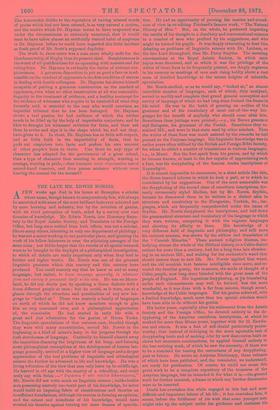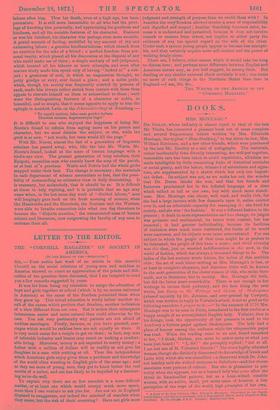THE LATE MR. EDWIN NORRIS.
AFEW weeks ago died in his house at Brompton a scholar whose name, though known to comparatively few, will always be associated with some of the most brilliant feats ever achieved not by mere learning and industry, but by the intuition of genius, with its vivid perception of truth, aided by a survey over vast domains of knowledge. Mr. Edwin Norris, late Honorary Secre- tary to the Royal Asiatic Society, and Translator to the Foreign Office, but long since retired from both offices, was not a scholar, like so many others, labouring in only one department of philology ; he was not a miner working in one particular place, and ignoring the work of his fellow-labourers in even the adjoining passages of the same mine ; nor did he forget that the results of all special research were to be brought to the daylight of a philosophical investigation, to which all details are really important only when they lead to farther and higher truths. Mr. Norris was one of the greatest linguistic geniuses which this century and this country have produced. You could scarcely say that he knew so and so many languages, but rather, he knew language generally, in whatever form and variety it presented itself to his view. He was no Mezzo- fanti, be did not dazzle you by speaking a dozen dialects with a dozen different people at once ; but he could, as it were, see at a glance through the structure and peculiarities of any new lan- guage be "looked at." There was scarcely a family of languages on earth of which he did not know members enough to give him an easy command over, and a philosophical appreciation of, the remainder. He had started in early life with a great and just admiration for the genius of Horne Tooke. The linguistic speculations of that eminent man, blended though they were with many eccentricities, served Mr. Norris in the beginning as a kind of miner's lamp in his progress through the dark storehouses of language. Gradually he himself cleared away the impurities dimming the brightness of his lamp, and forming more philosophical conceptions of the development of human lan- guage generally, arrived at a higher view of language and a deeper appreciation of the real problems of linguistic and ethnological science the further he advanced in life and knowledge. He was a living refutation of the view that men only learn up to middle age. He learned in old age with the alacrity of a schoolboy, and could truly say with Solon :—" rnpcierxed d' °del ,:roX),(1 dtbaay.6,tkEyoc." Mr. Norris did not write much on linguistic science ; unlike bolder men possessing scarcely one-tenth part of his knowledge, he never would build an imposing fabric of classifications and theories on insufficient foundations, although his caution in forming an opinion, and the extent and soundness of his knowledge, would have secured his theories against turning out mere dreams of specula-
tion. He had an opportunity of proving his caution and sound- ness of view in re-editing Prichard's famous work, " The Natural History of Man." But, on the whole, he preferred imparting the results of his thought in a desultory and conversational manner to a number of men who profited by his suggestions, and who might be termed his pupils. It was deeply interesting to hear him debating on problems of linguistic science with Dr. Latham, or the late Lord Strangford, then Mr. Percy Smythe. The morning conversations at the Royal Asiatic Society, in which such topics were discussed, and at which it was the privilege of the writer of these lines to be frequently present, are deeply engraven in his memory as meetings of men each rising boldly above a vast mass of detailed knowledge to the serene heights of scientific speculation.
Mr. Norris studied, or as he would say, " looked at," an almost incredible number of languages, each of which, duly analysed, served to modify and complete that grand general conception and survey of language of which he had long since formed the frame in his• mind. He was in the habit of penning an outline of the grammar and of the vocabulary of most out-of-the-way lan- guages for the benefit of anybody who should come after him. Sometimes these jottings were printed,—e.g., his Bornu grammar and dialogues, his grammar of the Foolah. Sometimes they re- mained MS., and were in that state used by other scholars. Thus the writer of these lines was much assisted by the remarks he had penned on the Feejeean language. His linguistic knowledge was in earlier years often utilised by the British and Foreign Bible Society, for whom he edited a number of translations in various languages,
e.g., in Maori. But the first spark from his genius, and by which he became known, at least to the few capable of appreciating such a feat, was his decyphering of the famous Asoka inscriptions of Kapandigivi.
It is almost impossible to enumerate, in a short article like this, the divers learned labours in which he took a part, or to which he contributed by his suggestions. One of the most memorable was the decyphering of the second class of cuneiform inscriptions, for- merly erroneously styled Median, but by Mr. Norris, Scythic, because he discovered them to be written in a dialect akin in structure and vocabulary to the Hungarian, Turkish, &c., lan- guages, which are frequently comprehended under the name of Scythic. Mr. Norris decyphered the inscriptions, and laid down the grammatical structure and vocabulary of the language in which they were written, comparing it with the cognate languages and showing its affinity to them. His knowledge of a very different field of linguistic and philosophy, and still more his eminent acumen, was shown by the edition and translation of the " Cornish Miracles." These ancient religious dramas, em- bodying almost the whole of the Biblical history,in a Celtic dialect extinct for more than a century, had for a long time lain slumber- ing in an ancient MS., and waiting for the enchanter's wand that should restore them to new life. Mr. Norris applied that wand, and the old monkish text became intelligible once more, and re-
vealed the familiar gossip, the manners, the mode of thought of a Celtic people, now long since blended with the great mass of the people of England. His ingenious decyphering, as his translating under such circumstances may well be termed, was the more wonderful, as it was done with a far from minute, though sound, knowledge of the Celtic languages. But his genius achieved, with a limited knowledge, much more than ten special scholars would have been able to do without his genius.
His latter years, especially after his retirement from the Asiatic Society and the Foreign Office, he devoted entirely to the de- cyphering of the Assyrian cuneiform inscriptions, at which he worked for more than fifteen years, together with Sir H. Rawlin- son and others. It was a feat of self-denial particularly praise- worthy, that instead of indulging in the more agreeable task of decyphering texts and of making éclat by new discoveries built on clever but uncertain combinations, he applied himself entirely to the less enticing work, of which he saw the necessity, if there was to be a standard for testing the correctness of any decyphering, past or future. He wrote an Assyrian Dictionary, three volumes of which have been published, and the remainder, we understand, are ready for publication. Of course, he could not mean this great work to be a complete repository of the treasures of the Assyrian language, but he intended it for what it is,—the ground work for further rseearch, a frame in which any further discoveries were to be inserted.
Death has overtaken him while engaged in this last and most difficult and important labour of his life ; it has overtaken him, it seems, before the fulfilment of his wish that some younger men might take up the subject under his guidance and continue his
labour after him. Thus his death, even at a high age, has been premature. It is still more lamentable to all who had the privi- lege of knowing him personally, and appreciating his goodness and kindness, and all the amiable features of his character. Eminent :as was his intellect, his character was perhaps even more amiable. A genial warmth of feeling, unchilled by any amount of dry and -exhausting labour ; a genuine kindheartedness, which shrank from no exertion for the sake of a friend ; a perfect freedom from per- sonal vanity, which placed all his discoveries at the disposal of any who could make use of them ; a simple modesty of self-judgment, which treated all his labours as mere attempts, and even after mature study made him speak only of having " looked at " a sub- ject; a greatness of soul, in which no ungenerous thought, no petty grudge or envy, ever found a place ; and a noble pride, which, though his society was frequently courted by persons of rank, made him always rather shrink from contact with them than appear to obtrude himself on them or subservient to them ; such were the distinguishing features of a character so noble, so beautiful, and so simple, that it seems apposite to apply to him the epitaph in monkish Latin on the Johanniskirchhof at Niirnberg :— " Te rapnit coelam, tales nam gandet habere
Illustres animas, degeneresque fugit."
it is difficult to one who enjoyed the happiness of being Mr. Norris's friend to refrain from saying more on his person and character, but we must dismiss the subject, or else, while the grief is so new, "not words, but tears would fill the page."
With Mr. Norris, almost the last of a generation of linguistic scholars has passed away, who, like the late Mr. Watts, Mr. Norris's friend, looked at the maze of human language with a bird's-eye view. The present generation of busy scholars, their Epigoni, resembles men who exactly know the map of the parish, or at best of 'a province. Watts and Norris had the whole globe mapped under their feet. The change is necessary ; the materials in each department of science accumulate so fast, that the possi- bility of commanding an extensive view is daily diminishing. It is necessary, but melancholy, that it should be so. It is difficult .at times to help repining, and it is probable that an age may come when, in the hot noon-day work of "divided labour," men will longingly gaze back on the fresh morning of science, when the Humboldts and the Herschels, the Norrises and the Wattses, were able to breathe connection into what one day threatens to 'become the " disjecta membra," the unconnected mass of human science and literature, now outgrowing the faculty of any man to -embrace them all.



































 Previous page
Previous page